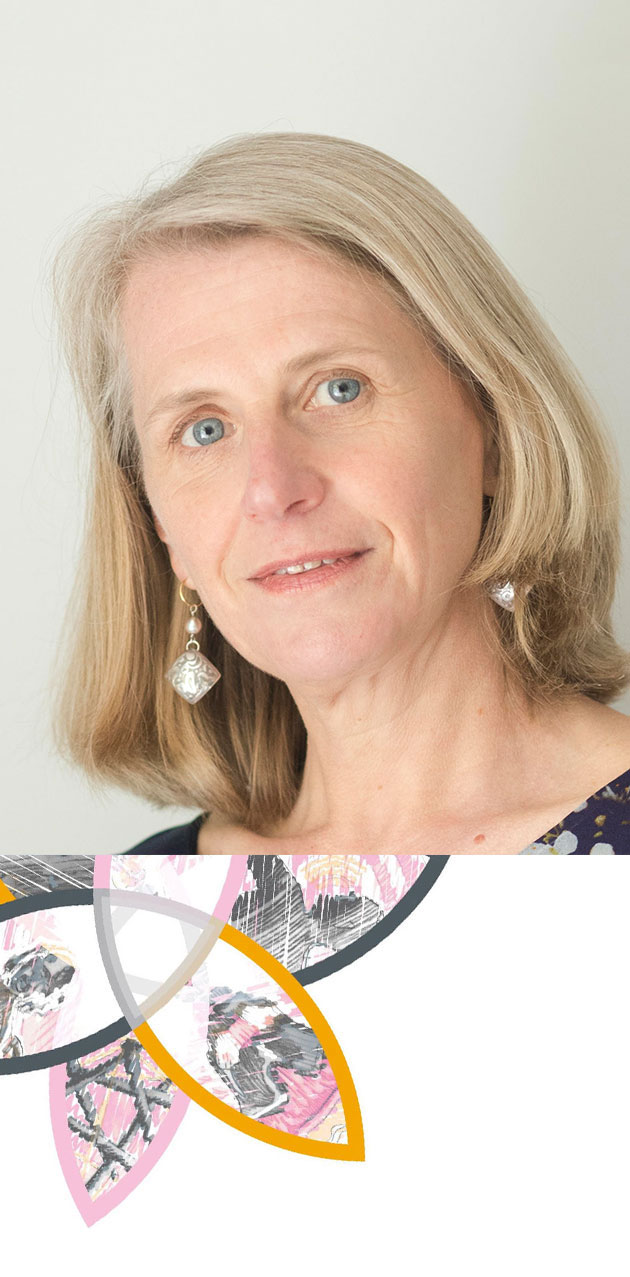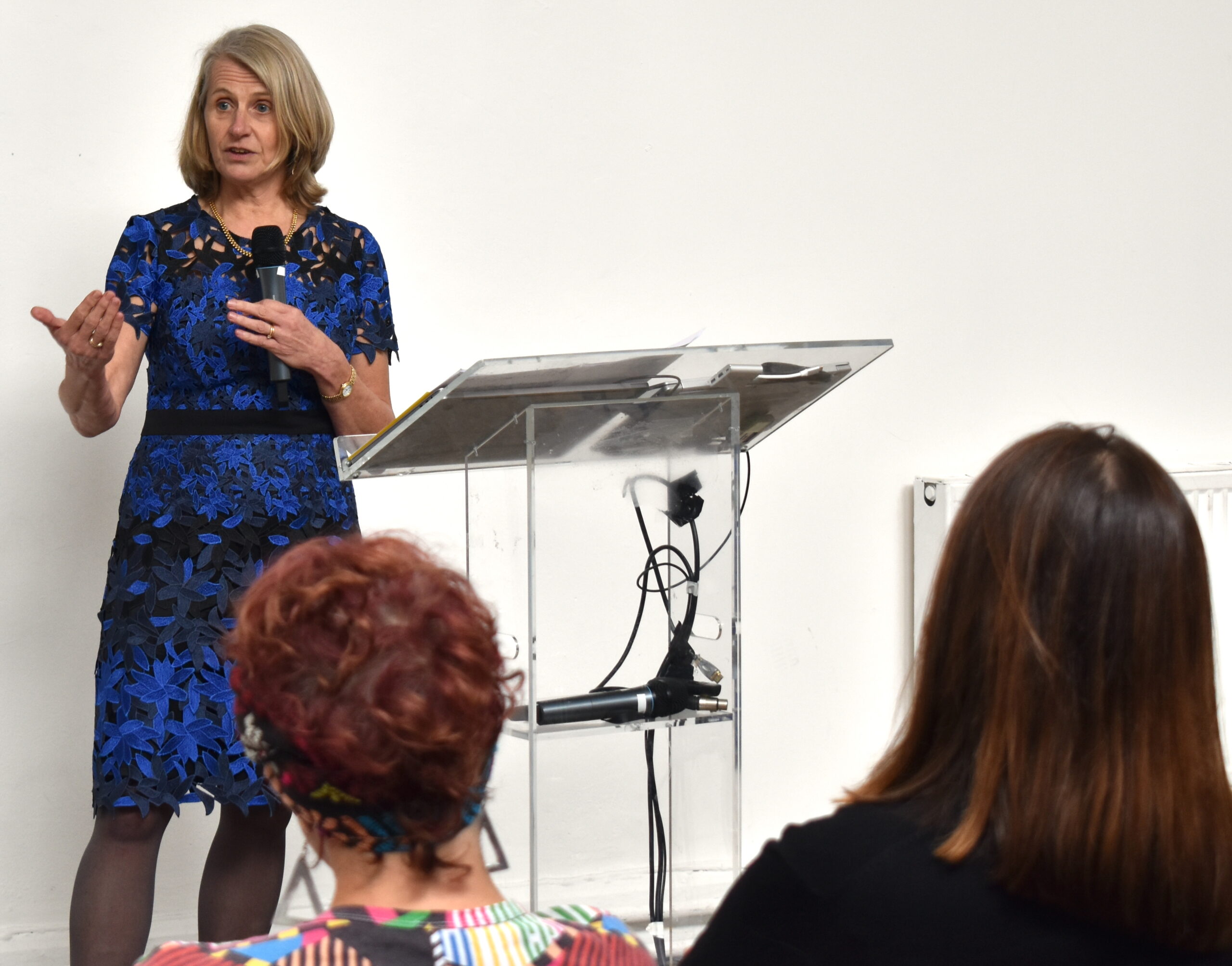
PhD, BA (hons), ARCM
All voice users suffer from ill health at some time. Jenevora works with singers who are recovering from injury, or just singers experiencing a problem with their voices. Her approach is always through the biopsychosocial lens; everything is connected and there is never one single cause for a voice issue. As a regular member of the team in an NHS multidisciplinary Voice Clinic, she has an ongoing understanding of vocal health and healing. Jenevora’s work is embedded within the multidisciplinary, holistic Voice Care Centre. The centre provides singers with joined-up treatment and care, working as a team to support the process of rehabilitation beyond just recovery. She is also a director of Vocal Health Education providing professional training internationally in vocal health and rehabilitation. Jenevora spent many years working as a professional opera singer, this lived experience combined with her years of research and training give her a unique insight into the demands of the professional voice user.
Qualifications / Certificates
- PhD in Health and Music
- BA(hons)
- ARCM
- Coaching and Mentoring Level 7 (UWTSD) (2019), member of the Association for Coaching
- PhD (2010) The implications of intensive singing training on the vocal health and development of boy choristers in an English cathedral choir
- Completion of Accent Method breathing course (2008)
- Completion of Estill Voicecraft levels l and ll (2001)
- Certificate in Vocal Anatomy (Meribeth Bunch) (1999)
- Certificate of Advanced Study GSMD (1989)
- ARCM (performance) (1987)
- BA (Hons) Music, Bristol University (1986)
Awards
- Van Lawrence Prize for outstanding contribution to voice research
Publications and Research
- Teaching Singing to Children and Young Adults. 2013 Compton Publishing Ltd
Over 3,000 copies sold worldwide, now published in a 2nd edition from 2018
A hands-on guide for singing teachers, choral directors and voice students. It explains both the abilities and limitations of young singers through the various stages of their lives, outlines appropriate technique – including approaches suitable for different musical styles, adolescence and gender – and provides anatomical descriptions and sample exercises throughout. Along with explanatory case studies, the book also addresses topics such as the teaching of children with special educational needs, vocal health, and the structuring of lessons, warm-ups and individual practice times.
- PhD (2010) The implications of intensive singing training on the vocal health and development of boy choristers in an English cathedral choir
Current Writing
- The Choral Singer’s Guide to a Lifetime of Healthy Singing. A manual for amateur choral singers giving simple technical advice for easier singing with greater stamina, range and projection. Also outlining the effects of ageing, medications and hormone changes on the singing voice.
Past Research , Post-Doctoral
- Research Associate at York University for Healthy Voice in Choir Singing, part of the EU funded Vision on Innovation for Choral Music in Europe. 2014-2015
- Consultant for AHRC funded research project, Edgehill University and University of York (2008– present) Widening young male participation in choral singing. 2009-2011
- Warming up for musicians: an investigation into the efficacy of warming up techniques with relation to findings from sports science. 2012-2013
Authored Books and Book Chapters
- Teaching Singing to Children and Young Adults. 2nd Ed 2018, Compton Publishing Ltd
- The Oxford Handbook of Singing. 2013 OUP; Eds. Welch, G. Howard, D. Nix, J. Chapter 4.6 Boys’ singing voice change in adolescence, Co-author with Harrison, S.
- The Oxford Handbook of Music Education. 2012 OUP; Eds. McPherson, G. Welch, G. Chapter 5.4 The Young Singer, Co-Author with Kenneth Phillips and Robert Edwin.
- Perspectives on Males and Singing. 2012 Springer; Eds. Harrison, S. Welch, G. Adler, A. Chapter 11: Cathedral Choirs in the United Kingdom: the professional boy chorister.
- Inside the Voice. Faber/Sing up e-book 2011 http://www.singup.org/songbank/teaching-tools/teaching-resource-detail/view/50-inside-the-voice/
- Voice for Life. RSCM 2004. Two chapters: Boys’ changing voices, The countertenor voice
Broadcasts and Podcasts
Interview on Radio 3 The Choir, with Suzi Digby, February 2013
Interview on BBC Radio Cornwall Sunday Breakfast, August 2014
Interview on Secklow Sounds. Pamela Kay’s Voice Matters, February 2019
Podcasts for VocalFri, July 2019; ISingMag, Jan 2020; BAST, 2019; Elevate Music, 2021; A Voice and Beyond, 2021
Papers in Refereed Journals
- Williams, J., G. Welch, D. Howard (in press). “Which Sung Pitch Range is Best for Boys during Voice Change?” Journal of Voice
- Howard, D., J. Williams, et al. (2014). “‘Ring’ in the solo child singing voice.” Journal of Voice 28(2): 161-169.
- Howard, D., J. Brereton, et al. (2007). “Are real-time displays of benefit in the singing studio? An exploratory study.” Journal of Voice 21(1): 20-34.
- Williams, J., G. Welch, et al. (2005). “An exploratory baseline study of boy chorister vocal behaviour and development in an intensive professional context.” Logopedics Phoniatrics Vocology 30(3-4): 158-162.
- Book Review. Chapman, J. Singing and teaching singing: a holistic approach to classical voice. San Diego: Plural; 2006. Logopedics Phoniatrics Vocology, 31(4), 190-191,
Articles
- Voice Foundation Symposium, Philadelphia May/June 2019 The VASTA Voice Vol 14, Issue 3 Sept 2019
- Why do we sing? Classical Music, 1042 March 2018
- Finding the right words. Singing: Voice of the Association of Teachers of Singing, 72, 6-8. 2017
- Vocal Training for Choristers series of three articles for Cathedral Music Magazine, issues 2/15, 1/16 and 2/16
- How to look after your voice. National Youth Choirs of Great Britain website 2012
- Teaching young voices safely. Foundations for Excellence 2011
- Regular articles in Sing-up newsletter
- Regular column in Singing-out, newsletter of the Choir Schools association
- Teaching young voices safely 2. Singing: Voice of the Association of Teachers of Singing, 62, 5-7. 2012
- Teaching young voices safely 1. Singing: Voice of the Association of Teachers of Singing, 61, 5-7. 2011
- The vibrato discussion. Singing: Voice of the Association of Teachers of Singing, 53, 21-22. 2007
- Letter to the editor. Journal of Singing, 64(1), 9-10. 2007
- Boy wonders, The Singer, Rhinegold publ; June/July 2006
- The Method in the Madness: teaching child choristers Singing, Voice of the Association of Teachers of Singing 2003
- An investigation of two German boys’ choirs, Leipzig and Dresden, and a comparison with the equivalent London cathedral choirs. London: Institute of Education 2003
- The Changing Adolescent Voice in the Cathedral Choir Information and Procedure for St Paul’s Cathedral Child Protection Policy 2002
- Chorister training – Education or Exploitation? Singing, Voice of the Association of Teachers of Singing. No. 41, 22-24 2001
Invited Papers at International Conferences
- “What are Emotions?” Keynote Lecture for BVA conference, 28th July 2020
- “Which sung range is best for boys during voice change?” Care of the Professional Voice, Voice Foundation’s 48th symposium, Philadelphia May/June 2019. PEVOC, Copenhagen August 2019
- Vocal Health and Wellbeing Wavelength Choral Conference, Woking 2018
- Teaching Young Voices and Understanding the Voice ABCD conference, Leeds 2018
- Jury panel for International Choral Festival, Malta. November 2017
- Discussion Forum for PEVOC, Ghent, August 2017
- ‘Why do we sing?’ British Voice Association, September 2017
- ‘Hormones and pitch in the singing voice: lifespan changes and gender choices including transgendered voices’ Voice Care Network and International Centre for Voice, November 2016
- ‘Teaching singing to children: What, Why and How?’ British Voice Association, July 2015
- ‘Start as you mean to continue: Warming up and moving on’ Healthy Voices, Healthy Lives; Sidney de Haan centre, Canterbury University 2015
- ‘A baseline study on male chorister vocal behaviour and development in an intensive professional context’
York University, February 2005; Malmö, SWEDEN May 2005; St John’s, Newfoundland, CANADA June 2005; PEVOC London, August 2005
- ‘A mirror for sound’ A practical exploration and demonstration of computer software as a tool for teaching singing’ SEMPRE, GSMD, February 2006; PAS, York University, May 2006
- ‘Intensive vocal training and the developing voice’
Cathedral Organists Association, St Paul’s Cathedral, November 2006
- ‘Boys’ changing voices: the use or misuse of falsetto singing’ Choice for Voice, GSMD London. July 2008
- An investigation of ‘ring’ in the singing voices of highly trained child performers’ PEVOC Dresden 2009
- ‘Boy choristers: vocal health and development’ Choir Schools Association, Christchurch Oxford 2010
- ‘Is adolescent voice change in boys a healthy process? Suitable assessment criteria for adolescent boys’ voices, in both clinical and pedagogical settings’ Choice for Voice, London 2010
- ‘Teaching young singers safely’ Foundations for Excellence, Dartington Hall 2011; ABCD, Leeds 2012; Centre of Excellence for Voice, Leuven 2012
- ‘Warm-ups for musicians’ The Reflective Conservatoire, GSMD 2012
- ‘Vocal Health’ ABCD, Leeds 2012
- ‘Teaching young singers safely’ International Congress of Voice Teachers, Brisbane, Australia. July 2013
- ‘Teaching young singers safely’ European Voice Teachers Association, Belgium. October 2013


